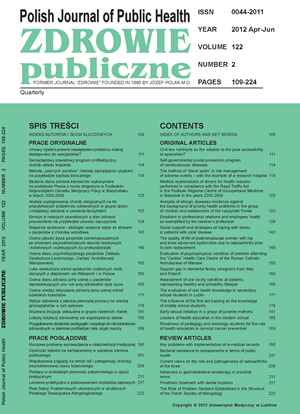Emotions in professional relations and employees’ health as exemplified by the teacher’s profession
Keywords:
health condition, positive and negative emotions, emotional intelligenceAbstract
Introduction. The teacher’s profession demands being in constant and intensive contact with other people, which entails a significant emotional strain and may, as a consequence, lead to health problems.
Aim. The purpose of the study was to analyze the interrelations between the teachers’ health and the emotions they experience in contacts with students, and the ability to control the emotional states experienced.
Material and methods. The study included 100 teachers, of whom 91 were women and 8 were men (one participant did not state the sex). Their health condition was examined by means of GHQ-12. The PANAS scale was used to evaluate positive and negative affectivity, and the INTE questionnaire to measure the emotional intelligence level. Declared emotions were measured using a questionnaire developed for the purposes of this paper.
Results. The relationship between negative emotions and health was found during the control of seniority and dispositional variables: positive and negative affectivity and emotional intelligence. The level of health disorders in the examined teachers negatively correlates with emotional intelligence (r=-0.43, p<0.01) and positive affectivity (r=-0.43, p<0.01). And the level of health disorders correlates positively with negative affectivity (r=0.36, p<0.01) and experiencing negative emotions (r=0.42, p<0.01). However, experiencing positive emotions more frequently is not connected with a lower level of health-related problems (r=-0.15, p>0.05).
Discussion. The strongest predictor of general health among the dispositional variables included in the study proved to be emotional intelligence. Nevertheless, the general health of the teachers studied is affected by a number of factors, both personality-related and dispositional as well as the situation or rather the negative emotions aroused by different events associated with contacts with students.
Conclusions. Health is affected not only by the experiencing of negative emotions but also by competent work and the way of managing emotions. These skills play an important role not only in the teacher’s profession but also in other social professions.
References
1. Ogińska-Bulik N, Juczyński Z. Osobowość, stres a zdrowie. Warszawa: Difin; 2008. p. 120-40.
2. Goldberg D, Williams P. Podręcznik dla użytkowników Kwestionariusza Ogólnego Stanu Zdrowia. Łódź: Oficyna Wydawnicza Instytutu Medycyny Pracy im. prof. J. Nofera; 2001. p. 204-10.
3. Watson D, Clark A, Tellegen A. Development and Validation of Brief Measures of Positive and Negative Affect: The PANAS Scales. J Pers Soc Psychol. 1998;6(54):1063-70.
4. Hupper F. Positive emotion and cognition: developmental, neuroscience and health perspectives. In: Hearts and minds: Affective influence on social cognition and behaviour. Psychology Press. New York; 2005. p. 42-60.
5. Fredrickson BL. The role of positive emotions in Positive Psychology. Am Psychol. 2001;56(3):218-26.
6. Sęk H. Udział pozytywnych emocji w osiąganiu zdrowia. In: Heszen, Życińska (ed). Psychologia zdrowia w poszukiwaniu pozytywnych inspiracji. Warszawa: Wydawnictwo Academica; 2008; p. 60-85.
7. Mayer JD, Roberts RD, Barsade SG. Human Abilities. Emotional Intelligence. Annual Review of Psychology. 2008;59:507-34.
8. Jaworska A, Matczak A. INTE Kwestionariusz Inteligencji Emocjonalnej. Warszawa: Pracownia Testów Psychologicznych Polskiego Towarzystwa Psychologicznego; 2001.
9. Grzegorzewska KM. Indywidualne i organizacyjne czynniki a poziom stresu w zawodzie nauczyciela. In: H. Polańska-Wrona (ed). Zdrowie – stres – choroba: w wymiarze psychologicznym. Kraków: Impuls; 2008. p. 100-20.
10. Kretschmann R. Stres w zawodzie nauczyciela. Gdańsk: Gdańskie Wydawnictwo Psychologiczne; 2004. p. 10-22.
11. Picardi A, Abeni D, Pasquini P. Assessing psychological distress in patients with skin diseases: reliability, validity and factor structure of the GHQ-12. J Eur Acad Dermatol Venereol. 2001;15(5):410-17.
12. Ogińska- Bulik N. Stres zawodowy w zawodach usług społecznych: źródła, konsekwencje, zapobieganie. Warszawa: Difin; 2006. p. 125-42.
13. Parkers KR. Coping, negative affectivity, and the work environment: Additive and interactive predictors of mental health. J Applied Psychol. 1990;75(4):399-409.
14. Mann S, Holdsworth L. The psychological impact of teleworking: stress, emotions and health. New Technology, Work and Employment. 2003;18(3):196-211.
15. Todaro JF, Shen BJ, Niaura R, Spiro A, Ward KD. Effect of negative emotions on frequency of coronary heart disease. Am J Cardiol. 2003;92:901-6.


